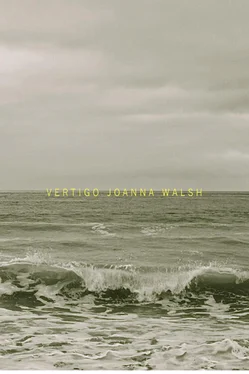Could her husband have been the cause of her happiness? She thought of him but her thoughts refused to alight on one feature that might anchor that feeling. She tried the physical: his eyes, his forearms, his cock and balls … they all seemed much as they had been, she could think of any with equanimity. Perhaps it was something he did, some quality of mind? No, none of these.
How long does a thought take to form? Years sometimes. But how long to think it? And once thought it’s impossible to go back. How long does it take to cross an hour? The plane crosses the map so slowly, though it goes at how-many-kilometers-per-second. The plane desires, as its passengers desire — hoping the luster below might be the sea — to come to an end, but its desires draw it across the land only by inches.
If we were flying from Paris we would just have left. The flight would be short. She tried to persuade herself to forget the hours of flight already passed, so it would be as though the plane had just left the runway, but it was impossible. Why was it impossible to forget what had happened, impossible to look at time only one way?
Holidays are about returning, losing. You should come back lighter than you went. I know some people think different, collecting fat and souvenirs, but I have lost something. Why was it important, this having to get back? She had forgotten already. The objects that returned with her would be happier, she knew, when she reached the end of her journey. The tweezers would return to a place in which they knew their place, or one of their many places. The clothes would fall back on their cycle of washing and ironing, would breathe a sigh of relief.
When he gets up, something in his back pocket traces a square along the lines worn by his wallet. It may be his wallet; it may be the piece of stone. I do not ask. He does not volunteer. He withholds its power. I allow him to.
The land tips away from the plane. No vertigo. Too high.
And, after the third descent, the departure of the idea of anything bad happening.
It’s not so much that we were young, because some of us were already old, old enough for gray hairs. It’s more that our children had made us young. Already in the youth of our young motherhood our children had given birth to our function. We hardly knew we were born of them, before we were named: Connor’s mum or Casey’s mum but never Juliet, or Nell, or Amanda, not for years anyhow, by which time we had skipped the remains of adulthood and were only old.
But for a while we were young. You could tell because we acquired new things made from young materials. Our things were smooth, plastic, round-cornered, safe: clearly designed to be used by the very young. It was necessary that we did not hurt ourselves, we young mothers, though the temptation was so very great. We were needed, and the plastic things were needed so we mothers, who had become our own children, did not hurt ourselves. See how patiently we taught ourselves to use the new things. You could call it nurturing.
It had not started there, at our birth: our youth went further back. Pregnant, we already wore dresses for massive two year olds: flopping collars balancing our joke-shop bellies, stretchmarked with polka dots. After we were born into our new young motherhood our trousers sprouted many pockets for practicality. Khaki was good (grass-stains, tea-stains). You could put them through the rinser. Fleece was warm and stretchy for growing bodies. Shoes were flat for running, playing. Colors were bright, so our children did not lose us, so we could not lose each other, or ourselves, no matter how hard we tried.
See how we looked after our young selves, awarding ourselves little treats — cakes, glasses of juice, or wine — never too much. If we noticed ourselves crying in a corner, we went to comfort ourselves. Sometimes we left ourselves alone to toughen up a little, but always with a watchful eye. Truly we were well cared for. Look how carefully we introduced ourselves to new environments: on our first day at playgroup we may have been reluctant, tearful even, to be herded together by virtue of situation and approximate age, but we remembered the manners we had taught ourselves: a good grounding. Seeing ourselves shyly approach each other we looked on with approval, breathed a sigh of relief.
Then we had to remember how to play.
We young mothers sang nursery rhymes. We had not sung in years. It came hard to us, sitting on the floor cross-legged in colored tops and practical trousers, singing about crocodiles all together, toddlers flopped in our laps. We had nothing else to sing. You would have thought we could have invented, for this fresh generation, the newness it deserved. But we were tired.
You might have thought we could have done it, but we were so poor.
At the end of each day when our men came home we young mothers were already tired. We were younger than our children: the children that had birthed us. Our men wondered how they could be married to such children. Bedtime approached, and the men settle down to something adult on the television. We mothers were terrified, did not want to go once more into the interrupted dark. Distracted by noises, bewitched by things that sparkled, we lulled ourselves to sleep, overtired, tearful, telling ourselves tomorrow it would be okay.
In the playground the next day, we watched older mothers bring lunch boxes and spare sweaters to children who might not have wanted this kind of mothering. They made sure the kids were still kids. And the children, ignoring them politely, went on letting the mothers be mothers, for who knows what ends.
I have had some good times in this body like right now, looking out of the window. Opposite the window is another window, and through that window, another. The window frames are dark brown and made, perhaps, of metal. They come in pairs, one frame inside another, the inner located in the top right corner of the outer. The smaller frame might open, but none of the windows is open. This might be because it is raining. Through the window opposite is a white wall with a doorframe and, through that, a window that looks onto another white wall. Sometimes people pass between the brown frames and the white walls, and their colors look shabby.
Perhaps, walking along the corridor with the windows, the people who come and go can also see me through this window, sitting and not moving, my face toward them, with the back of a smaller head between me and my window, which they must see only as a shape blocking the lower part of my face. I realize that my body is enjoying looking out of the window, and that this is because it has not been asked to do anything for some time. It has been sitting here, constrained, not so much from coercion as politeness, while, inside it, I have been waiting. In the seat across from me, he is waiting. Though he is a child, the nursery-red plastic chairs we have both been given are too small even for him, and child us both further.
The nurses wear blue — the uniforms of attendants at petrol stations: blue polo shirts, loose blue slacks. Around their necks, ID on red ribbons. Each visits us alone. Each brings a clipboard. We fill in our details with erasable pen. Each nurse asks me questions. The questions are not for me. The questions are for him and, not so much from coercion as politeness, I repeat them until he answers.
“Are you an atheist?”
“I think I’m more of a pessimist.”
He is nine years old, and he is the oldest child here. At the table behind us a girl aged about five, with one eye placed halfway down her face, looks at her fingers, which are short and twisted toes. Her mother hands her a book about princesses. She pries at it, then walks away, her elbows pressed into her sides, a flightless bird. Far at the other side of the waiting room, a different girl aged about three vomits onto the floor. Then a buzzer sounds until a cleaner comes with a bottle of amnesia.
Читать дальше











